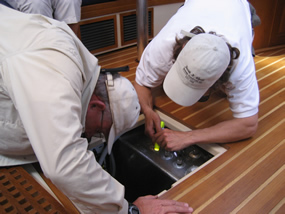Yacht Buying Tips
Tips for Buying a Good Used Boat

For most of us, buying a good used boat is the sensible choice to make. You can save thousands of dollars by avoiding the initial depreciation hit. Plus, many sellers are willing to include safety gear, spare parts, dinghy & outboard, and other valuable equipment with the boat. The following are simple tips to consider when buying a used boat:
Check out the builder of your chosen boat
Is it a highly regarded brand? Are they still in business? If not, it may prove difficult to obtain replacement parts when needed.
Why is the boat being sold?
In addition to other valuable information, the answer to this question can often give you hints as to how well the boat has been maintained before you even see it.
If the reason for selling is distress, as in financial or health problems, make sure the owner has continued to care for the vessel. However the up side is that you will often get a very good deal and if there are items that need to be replaced you can replace them with brand new equipment.
If the boat is being sold because the owner is moving up to a larger boat, this usually indicates that the owner is a boating enthusiast and is more likely to have taken good care of the boat.
Find out if the boat has a full maintenance log
This should list all services, repairs, oil changes, etc. with dates and costs. Many owners keep excellent records which is very reassuring to a potential buyer. Be wary of boats with sketchy or non-existent maintenance logs.
Does it have all the equipment you need or want?
Make a checklist of what you want on your next boat. Compare that list with the specs of boats that interest you. Keep in mind that technology changes rapidly. Even if the boat appears to be well equipped, the equipment may not compare to the ‘latest and greatest’. However, you may find that the current equipment is adequate for your needs. The best rule of thumb when considering new equipment is wait until you know you really need it.
How was the boat used?
Ideally, you want a boat that has had regular use. Although lightly used boats with low engine hours may seem appealing, lack of use is the number one enemy of the many complicated systems on a boat.
Inspecting the Boat

Survey & Sea Trial
When you have agreed on a price and the Purchase and Sale Agreement has been signed by both parties, you will then be asked to place a deposit (usually 10%) in escrow with the broker. The next step will be a survey and sea trial. This is a vital part of the buying process; it enables you to see what you are getting before you part with your money.
It is recommended that you use a surveyor who is certified by NAMS and/or SAMS to conduct a detailed inspection of the boat. Unfortunately, anyone can call themselves a marine surveyor so it is important to make sure that yours is accredited by the relevant authority. If you have a trusted broker, he or she can usually recommend the more qualified surveyors in the area. Using a surveyor will give you peace of mind, and your finance company and insurance company may insist upon it. You should make every effort to attend the survey yourself. The most common practice is for buyer, seller, surveyor and broker to attend.

Here are some things you or your surveyor should check:
- How well has the boat been maintained? Start by looking at obvious features such as the gel coat, woodwork and upholstery. If these haven’t been maintained then there’s a good chance the rest of the boat has not had much care either.
- Are any areas of the exterior gelcoat poorly matching? This may indicate a previous accident which, in itself, may not be enough to dismiss the boat, but if the owner has not already mentioned it to you, beware.
- Check that all the control cables (for steering, throttle etc.) are in good working order. The steering and transmission should move freely.
- Look for waterlines inside the boat or on the engine. These would indicate that the boat has flooded in the past.
- Open and close all the hatches and sea cocks to ensure they’re in good working order. If there are any water stains around the hatches, it would indicate that they are no longer water-tight.
- Test all the onboard systems such as bilge pump, winches, freshwater system, lights, heater and air conditioning, generator, stove etc.
- Check that all hardware is attached firmly, and that electrical items and connections are free from rust.
- Examine the hull both in and out of the water. Take note of its general condition and look for any dents, cracks, chips or blisters in the gel coat. Tapping a fiberglass hull lightly with a rubber hammer, listening for voids, can help reveal delamination. Any fittings that go through the hull should be checked to make sure they are tight and won’t leak.
- Find the hull registration number and make sure it doesn’t appear to have been altered. Make sure it matches the number on the boat’s registration and title documents.
- While the boat is out of the water, you can also check that the keel runs in a straight line from fore to aft, and that the propeller, shaft and rudder are straight; do they show any signs of a collision or grounding? Look for signs of cavitation; this manifests itself as an erosion of the surface of the propeller blades – an indication of poor performance. Make sure that the propeller and shaft do not wobble.
- On a sailboat, check that all the sails and rigging are in good order.
* Don’t feel overwhelmed. These are all things a qualified surveyor will check and will document in detail in a written survey report.

Engine checks
Here are a few things your surveyor will look for:
- The presence of oil in the bilges – a sign of an oil leak.
- Oil or fluid leaks around gaskets and hoses.
- The level and condition of the oil. A milky appearance to the oil is a sign that water may be leaking into the engine. A burned smell or any grit in the oil are additional indications of mechanical problems.
- All hoses and belts. Are they cracked or degraded?
- Check for fuel leaks from hoses and check that the fuel tanks are sound.
- Are the engine mounts sturdy?
- Do the sacrificial anodes (if applicable) need replacing?
Although your surveyor will look for any obvious problems, a complete engine survey is not part of the usual survey. If you want an engine survey, your broker can help you arrange for that separately.

Sea Trial
If everything is up to your standards, it’s time to take the boat for a test drive. Typically, it is the responsibility of the seller to either captain the boat or arrange for a captain. Check the bilges, both at the start and end of the trial; you’re looking for any evidence of an oil leak. See how the boat performs when moving around. Is the steering responsive? Test that all the instruments are working correctly.
If you’re sea trialing a sailing boat, put the sails up and see how she maneuvers under wind power alone. Try tacking and different points of sale. Examine the mast and rigging under load.
If problems are discovered during the sea trial and survey, you may not necessarily need to reject the boat. Your broker can help you explore your options. You may be able to ask for a price concession to help defray the cost of repairs. However, it is important to remember that you are buying a used boat. It will not be perfect. It is better to look at the surveyor’s list of discrepancies as a list of things you can do after you buy the boat rather than things you want the seller to do before you buy.

Get it in Writing
If you decide to purchase the boat following a successful survey and sea trial, the next step is to prepare an Amendment (also known to some as an Acceptance of Vessel) agreement. Your broker will provide this document. The Amendment / Acceptance of Vessel will note any request for repairs and/or price concessions. It will also confirm your intention to move forward with the purchase of the boat providing the seller agrees with your requests.
